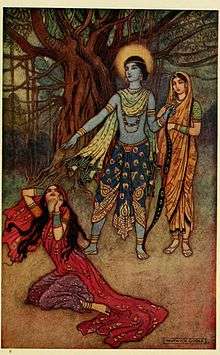Shurpanakha
| Shurpanakha | |
|---|---|
 The humiliation of Shurpanakha by Warwick Goble, 1913 |
Shurpanakha (Sanskrit: शूर्पणखा, IAST: śūrpaṇakhā, lit. she whose fingernails are like winnowing fans) is a character in Valmiki's epic, the Ramayana, and is the sister of the main antagonist, Ravana, King of Lanka.[1] She is known as Soorpanagai in Tamil, Sarpakanaka in Indonesian, Surpanakhar in Khmer, Surapandaki in Malay, and Sammanakkha in Thai.
Description and biography
Valmiki describes Shurpanakha by the time of the Ramayana's events as generally ugly (ghora mukhi):
- Pot bellied
- cross-eyed
- Thinning, brown hair
- A grating voice that is harsh on the ears.
- Oversized breasts; this can be translated to mean a heart full of wickedness.
The youngest child of Rishi Vishrava and his second wife, Kaikesi, Shurpanakha (the one with lethal and long nails) was given the name of Mīnakshi "Dīksha" at birth, and some also called her Chandranakha (the one with nails like the moon). As beautiful as her mother Kaikesi and her grandmother Ketumati had been before her, Shurpanakha grew up and secretly married the Danava prince of the Kalkeya Danava clan, Vidyutjihva. Ravana became enraged with Shurpanakha for marrying a Danava. The Danavas were the mortal enemies of Rakshasas, and he was about to punish her, but Mandodari convinced him to respect the wishes of his sister. Thus Ravana accepted Shupanakha, her husband and Danavas as relatives officially.
At the time of conquering Rasatala (the underworld), her brother, Ravana decided to visit his newly married sister, where he discovered Vidyutjihva's true motive to marry Shurpanakha – to kill Ravana. In Shurpanakha's absence, Vidyutjihva attacked Ravana, who in self-defense killed his brother-in-law.[2] This earned Ravana his hurt and miserable sister's great displeasure, and the widowed Shurpanakha then split her time between Lanka and the woods of Southern India, sometimes living with her forest-dwelling Asura relatives, Khara and Dushana, on Ravana's orders. She also had conceived a son by Vidyutjihva known as Shambhri who was accidentally killed by Lakshmana.
According to Valmiki, she met the exiled Prince Rama of Ayodhya, during one such visit to the Forest of Panchavati, and was instantly smitten by his youthful good looks. Rama meanwhile spurned her advances, telling her that he was faithful to his wife Sita and thus would never take another wife. Rejected, Shurpanakha then approached his younger brother, Lakshmana, who reacted in a similar manner and said she was not what he desired in a wife. Eventually seeing that the brothers were making fun of her, the humiliated and envious Shurpanakha attacked Sita but was thwarted by Lakshmana, who cut off her nose and left ear and sent her back to Lanka.
Shurpanakha first went to her brother Khara, who sent seven Rakshasa warriors to attack Rama, who easily dispatched them. Khara himself then attacked, along with 14,000 soldiers, all of whom were killed except for Akampan, Sumali's son and Kaikesi's brother, who fled to Lanka. She then went straight to Ravana's court and enticed her brother to abduct and wed Sita by extolling her virtues and beauty.Akampan too played a key role in instigating, Ravana.Despite opposition from their brother, Vibhishana, Ravana kidnapped Sita, triggering the Battle of Lanka.
Although Shurpanakha receives no further mention from Valmiki, it has been suggested that she continued to live in Lanka after Vibhishana succeeded Ravana as king. She and her half-sister Kumbini are supposed to have perished at sea a few years later.
Alternative accounts
Some versions of the Ramayana claim that Shurpanakha had no real romantic interest in the brothers, engineering Ravana's death in revenge for her husband Vidyujjihva's murder. After many years of plotting his downfall, she realized that Ravana had more than a match in Rama, who had killed both her brothers, Khara and Dushana who confronted Rama and Lakshamaņa after they were told of insult to Shurpanakha's fate by the duo. Her cousins were terrified of Rama, so Shurpanakha decided to pit her brother against Rama, knowing only that he was powerful enough to slay her brother.
References
- ↑ Johnson, W.J. (2009). A Dictionary of Hinduism (1st ed.). Oxford: Oxford University Press. doi:10.1093/acref/9780198610250.001.0001/acref-9780198610250-e-2386 (inactive 2018-09-11). ISBN 9780191726705.
- ↑ Valmiki Ramayan by Rajshekhar Basu - Uttarkanda
- Ramayana, A condensed prose version of the epic by C. Raja Gopalachari. Published by Bhavan's Book University
- Valmiki. Ramayana: Aranya Kandha
- Valmiki Ramayan by Rajshekhar Basu - Uttarkanda
External links
| Wikimedia Commons has media related to Surpanakha episode. |
.jpg)